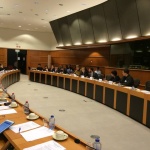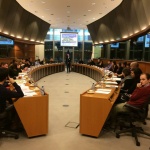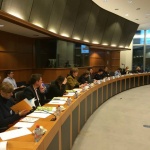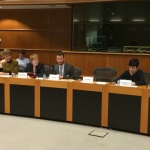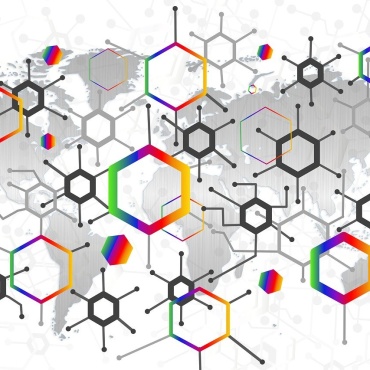Summary: Finding solutions to homophobic and transphobic bullying
On 28 January, the Intergroup on LGBT rights hosted a seminar on the topic of homophobic and transphobic bullying. Co-organised by the Youth Intergroup and the International LGBTQ Youth and Student Organisation (IGLYO), the seminar saw the launch of a research report on the impact of homophobic and transphobic bullying on education and employment.
All too often, young people are subject to bullying on the basis of their (perceived) sexual orientation or gender identity. The LGBT survey conducted by the Fundamental Rights Agency shows that over two thirds of LGBT people heard or saw negative comments or conduct at school towards someone perceived to be LGBT.
Under the chairing of Michael Cashman and Eider Gardiazábal Rubial, respectively Co-President of the LGBT Intergroup and Chair of the Youth Intergroup, civil society representatives and MEPs discussed how to tackle this issue.
Gallery
Part I: Launch of IGLYO’s research on homophobic and transphobic bullying
Jordan Long, IGLYO
Opening the first panel, Jordan Long from IGLYO gave an insight into the struggles on working on bullying at the EU level. He illustrated how the research that was conducted will be used to advocate for policy to address at all relevant levels.
George-Konstantinos Charonis, IGLYO and Colour Youth, Greece
George-Konstantinos Charonis, board member at IGLYO presented the minimum standards to combat homophobia. In his presentation George pointed at all policy levels that need to be addressed to fight homophobia and transphobia in education.
- Listen to the presentation
- View the presentation
- Read the Minimum standards to combat homophobic and transphobic bullying
Part II: Panel discussion on policy responses to homophobic and transphobic bullying
Eleanor Formby, Sheffield Centre for Education and Inclusion
Eleanor Formby, author of the research on The impact of homophobic and transphobic bullying on education and employment presented the research findings. The results show that bullying has a grave impact on educational performance, as well as on performance at the labour market. Furthermore, Eleanor also presented her own policy recommendations.
- Listen to the presentation
- View the presentation
- Read the research on the Impact of homophobic and transphobic bullying on education and employment
- Read the Advocacy recommendations
Phil Prendergast, S&D MEP
Phil Prendergast, an Irish MEP for the Socialists and Democrats highlighted the importance of education on sexual orientation, gender identiy and sexual health, drawing from her own experience as a midwife. She highlighted the importance of sharing best practices and the need for a policy framework at the European level.
Rebeca Sevilla, European Trade Union Committee for Education
Coming from a trade union background, Rebeca Sevilla, from the European Trade Union Committee for Education and Equality Coordinator Education International, highlighted the importance of teaching the teachers to provide inclusive and quality education.
Ida Kreutzman, OBESSU
Ida Kreutzman from the Organising Bureau of European School Student Unions adressed the problematic issue of persistent gender stereotypes and heteronormativity and how education can change these norms and stereotypes. Furthermore, she reflected on how this should be reached in practical terms.
George-Konstantinos Charonis, IGLYO and Colour Youth, Greece
Closing the seminar, George-Konstantinos Charonis addressed the links between economic crisis and the crisis in human rights in Europe. He addressed the concept of a multi-speed Europe, but argued that this is not durable when it comes to human rights.
Podcast: Play in new window | Download





